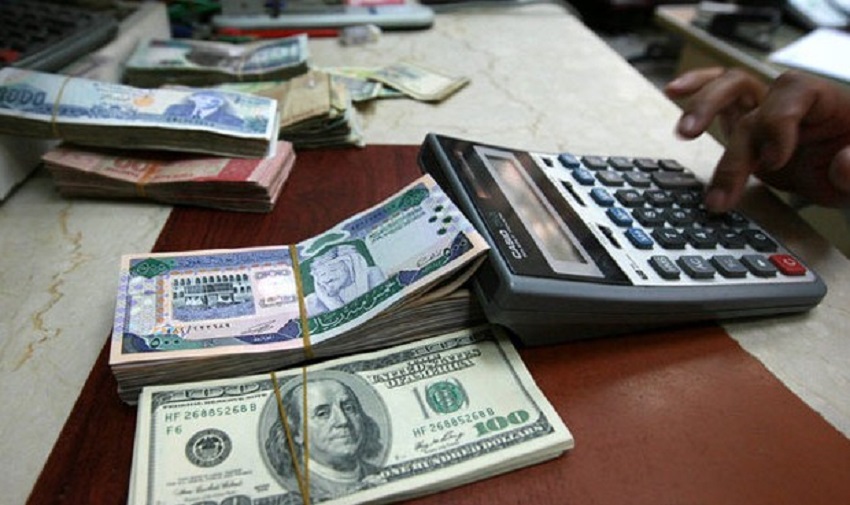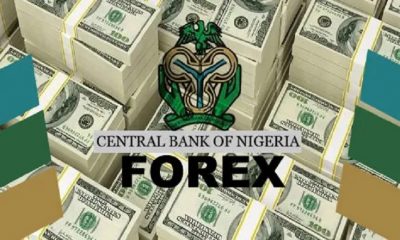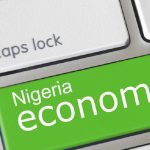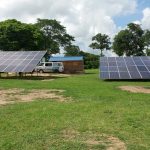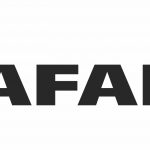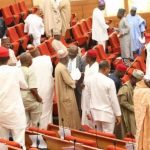Economy
Concerns Grow as Nigeria’s Foreign Reserves Decrease to $38.3bn
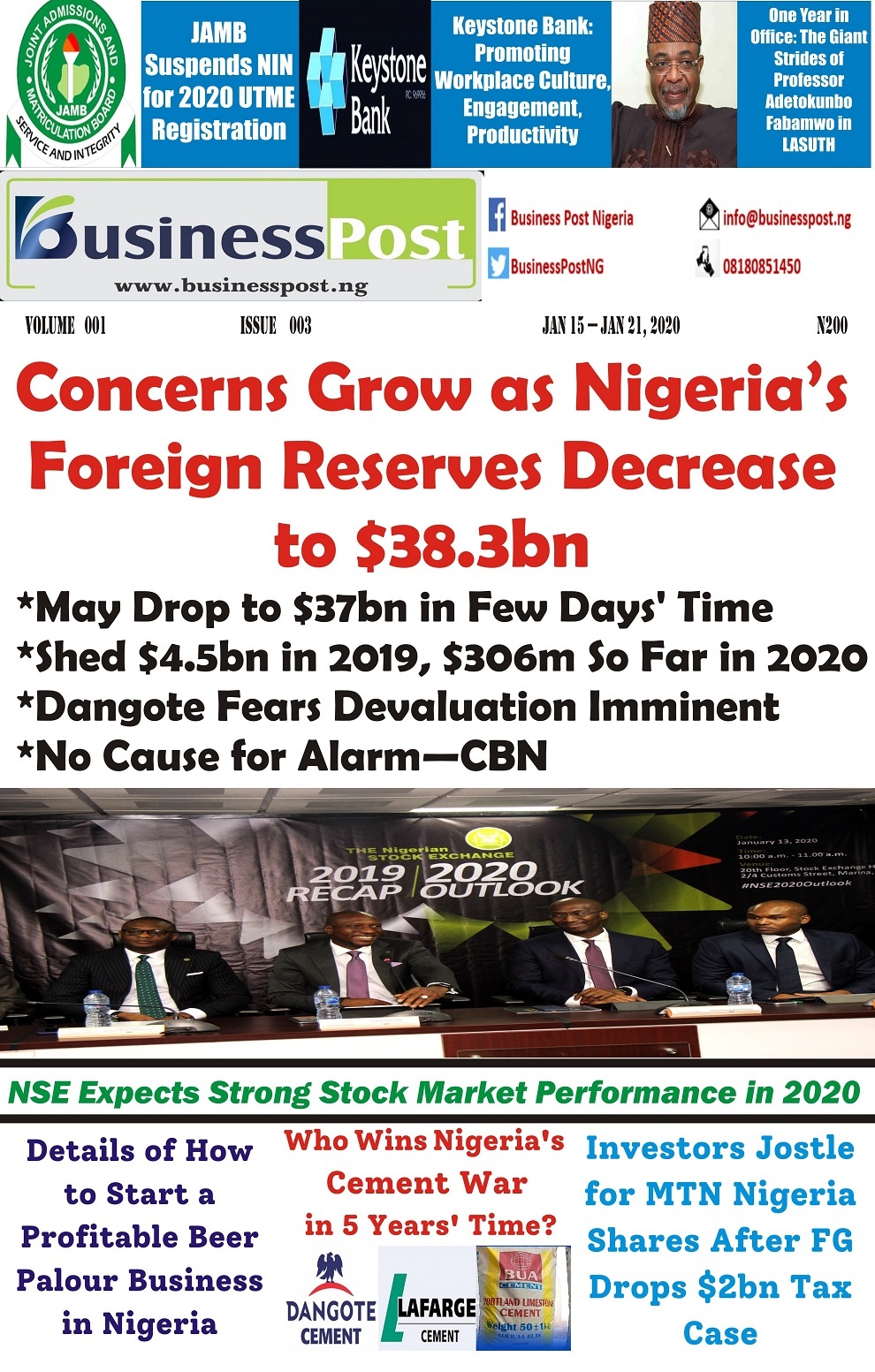
By Dipo Olowookere
**May Drop to $37bn in Few Days’ Time
**Shed $4.5bn in 2019, $306m So Far in 2020
**Dangote Fears Devaluation Imminent
**No Cause for Alarm—CBN
Though the Central Bank of Nigeria (CBN) has said Nigerians should not panic over the gradual decline in the foreign reserves, observers have cautioned both the fiscal and monetary authorities not sleep with their eyes closed because it might spell doom for the country.
This is because if the depletion of the reserves continues with the steady fall, the nation, which is Africa’s largest economy, may fall into another recession under the administration of President Muhammadu Buhari.
During his first term in office as a civilian leader of the country, just after a year he was sworn into office in 2015, Nigeria went into an economic recession. However, a year later, 2017, Mr Buhari and his team led the nation out of the crisis.
One of the main reasons for sliding into recession was a decline in the price of crude oil at the global market coupled with decline in the volume of the commodity produced.
The period was when restive Niger-Delta youth were attacking oil facilities in the oil-rich region, making it difficult for Nigeria to meet its daily production, resulting into lesser revenue from the sale of crude oil, the country’s main source of foreign earnings.
But when federal government held meetings with stakeholders from that part of the country, the attacks reduced and Nigeria started producing up to 1.7 million barrels per day, resulting into more money.
In 2019, the average price of crude oil at the international market was around $59 per barrel, while the benchmark for the country’s budget was $55 per barrel. This year, the benchmark was put at $60 and the price has remained around $63 to $65.
But despite the excess recorded from the sale of crude oil last year, the external reserves have been reducing, making some observers to raise concerns, urging the central bank to do something fast to prevent a devaluation of the Naira, which the present government does not support.
Business Post reports that the apex bank has been taking from the reserves to support the local currency, making it stable around N360 per Dollar at most of the various segments of the foreign exchange market.
For example, at the beginning of a new week, the CBN regularly releases the sum of $210 million to the forex market, with wholesale sector normally getting $100 million, the Small and Medium Enterprises (SMEs) and the invisible segments receiving $55 million each. At the end of the week, it also injects over $200 million into the Retail Secondary Market Intervention Sales (SMIS).
These interventions have contributed to the decline in the country’s reserves and the central bank has promised not to stop defending the Naira so as to avert currency speculations, which pushed the local currency exchange rate to over N500 to a Dollar over three years ago.
According to data obtained by Business Post from CBN, Nigeria’s external reserves have dropped about $306.1 million since the beginning of this year to $38.3 billion as at Friday, January 10, 2020.
In 2019 alone, the reserves depleted by $4.5 billion, depreciating to $38.6 billion at December 31 from $43.1 billion at January 2, 2019.
In November 2019, Business Post reported that Governor of the CBN, Mr Godwin Emefiele, told some potential investors in London, United Kingdom, that the devaluation of Naira would only be possible if the nation’s external reserves go below $30 billion and the international price of crude oil drops to $45 per barrel.
In 2017, President of Association of Bureau de Change Operators of Nigeria (ABCON), Mr Aminu Gwadabe, said Mr Emefiele assured his members that the bank had no intention to devalue the Naira.
But Africa’s richest man, Mr Aliko Dangote, is already planning ahead of a possible devaluation of the Nigerian Naira by the CBN.
He recently told Mr David Rubenstein of Bloomberg TV that in order not to be caught off guard, he was considering getting an office space in New York, United States of America, to protect the wealth of the family, expressing concerns that a devaluation of the currency may weaken his local investments.
“In Africa, you know we have issues of devaluation, so we want to really preserve some of the family’s wealth,” Mr Dangote, 62, was quoted as saying on the David Rubenstein programme, noting that the office space in New York will help to diversify his business and avoid the risk of currency fluctuations on his home continent.
Economy
Dangote Refinery Denies Importing Petrol, Diesel into Nigeria
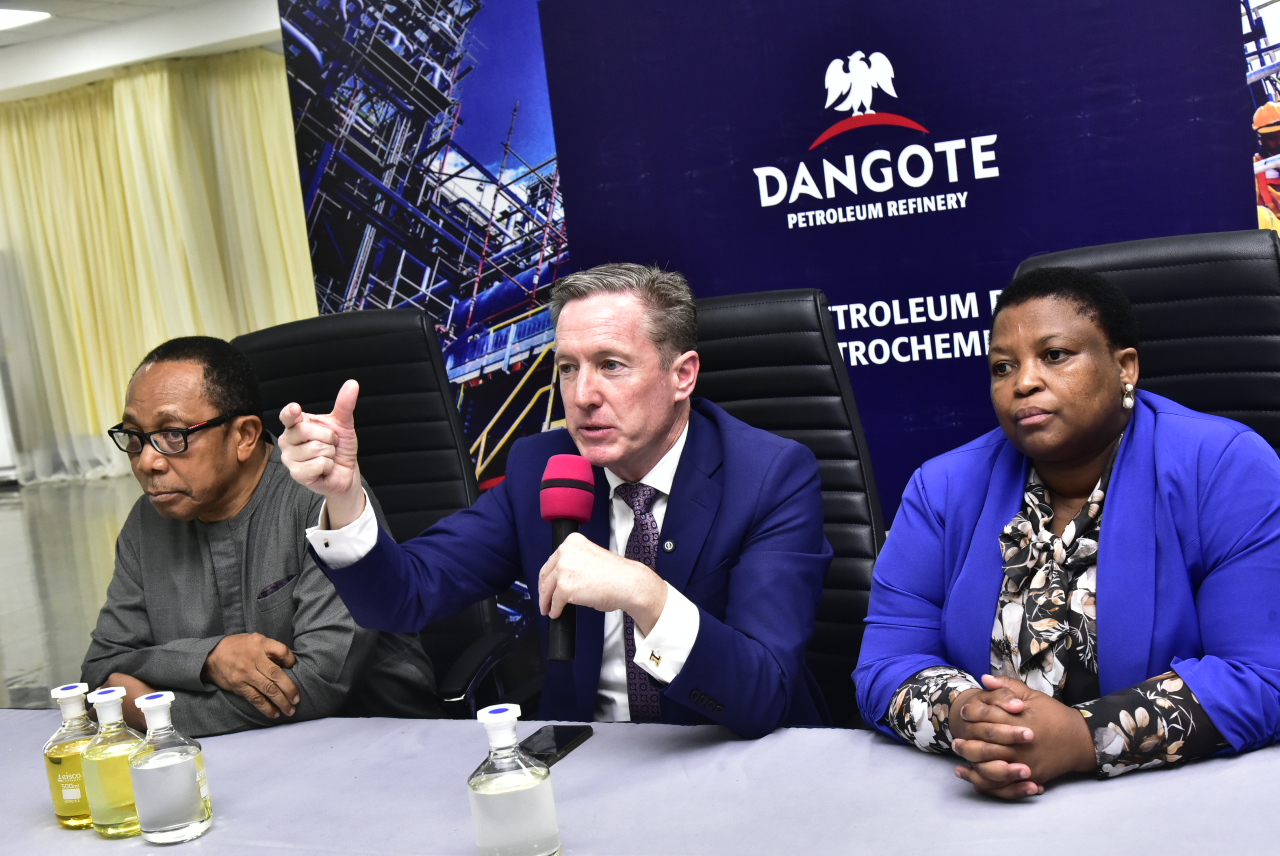
By Modupe Gbadeyanka
Dangote Petroleum Refinery and Petrochemicals has described reports making the rounds that it was importing finished petroleum products like premium motor spirit (PMS), otherwise known as petrol, diesel, and others into Nigeria as false and misleading.
In a chat with newsmen on Wednesday, the company clarified that what it brought into the country were merely intermediate or semi‑processed materials, which it emphasized is a standard practice within the global refining industry.
Intermediate materials—such as naphtha, straight‑run gas oil, vacuum gas oil (VGO), reformate, alkylate and isomerate—serve as feedstock for additional refining into finished fuels like petrol and diesel, as well as petrochemicals.
The chief executive of the facility, Mr David Bird, told journalists in Lagos that as a state‑of‑the‑art and large‑scale merchant refinery, DPRP refines crude oil and processes intermediate feedstocks into premium petroleum products and petrochemicals that meet the highest international standards, noting that this practice does not amount to importing finished petroleum products.
Mr Bird highlighted that Dangote Refinery operates using a European and Asian merchant refinery model, which integrates advanced refining, blending and trading systems designed to meet modern quality and environmental benchmarks.
“DPRP produces high‑quality fuels aligned with international environmental and health standards. Our gasoline is lead‑free and MMT‑free with 50 parts per million sulphur, while our diesel meets ultra‑low sulphur specifications. These standards help reduce emissions, protect engines, and safeguard public health,” the chief executive stated.
Mr Bird reaffirmed that the Dangote Refinery supplies only fully refined, market‑ready products, adding that semi‑finished fuels are unsuitable for vehicles and are therefore not released into the Nigerian market. Samples of both intermediate feedstocks and fully refined products were displayed to journalists during the briefing.
He further noted that the refinery was established to end years of exposure to substandard fuel in Nigeria by providing products that meet stringent global standards, adding that DPRP’s products are now exported to international markets, highlighting their quality and competitiveness.
The refinery chief stressed the company’s commitment to transparency in its operations and engagements with regulators, urging the media to help properly educate the public on the clear distinction between intermediate products and finished fuel.
“It is unfortunate that some individuals are deliberately spreading misleading narratives about a refinery that has transformed Nigeria and the West African region from a dumping ground for substandard fuels into a hub for high‑quality products,” he said, adding that the refinery’s flexible design allows it to process a diverse mix of crude oils and intermediate feedstocks into premium finished fuels.
Mr Bird assured Nigerians of sustained product availability, noting that the refinery has contributed significantly to easing fuel scarcity, stabilising the naira, and reducing pressure on foreign exchange.
On his part, the Chief Brand and Communications Officer of Dangote Industries Limited, Mr Anthony Chiejina, urged journalists to be precise in their choice of terminology, warning that inaccurate reporting could misinform the public and create unnecessary panic.
Economy
Nigeria to Overtake Algeria as Africa’s Third-Largest Economy in 2026—IMF
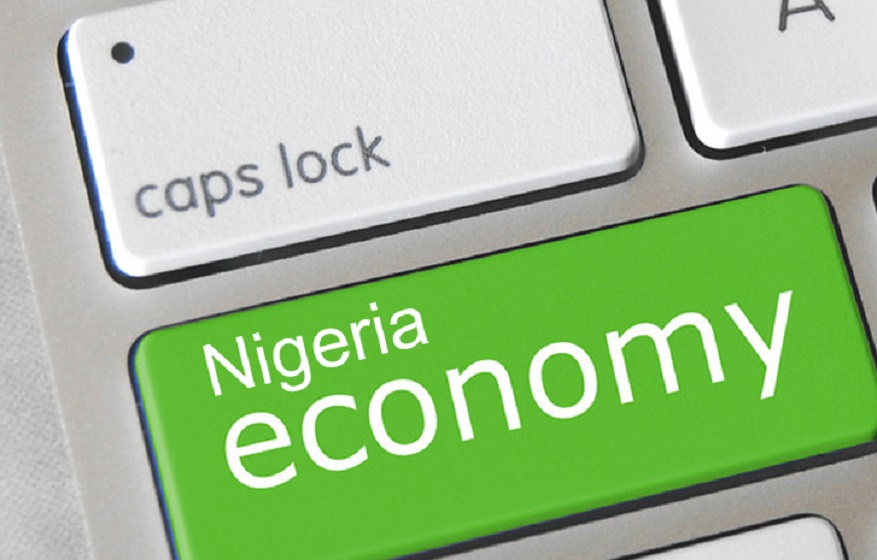
By Adedapo Adesanya
Nigeria is projected to move from being the become the third-largest economy in Africa in 2026 from the fourth position it clinched last year, according to data from the International Monetary Fund (IMF).
In the IMF’s World Economic Outlook (October 2025 edition), accessed via its datamapper, it was indicated that Nigeria’s gross domestic product (GDP) at current prices stood at about $285 billion in 2025, placing it behind South Africa, Egypt and Algeria.
South Africa topped the African ranking with a GDP of about $426 billion, followed by Egypt at $349 billion, and Algeria ranked third with $288 billion.
However, the IMF forecasts that Nigeria will overtake Algeria in 2026 as economic output rebounds, driven by higher oil production, improved foreign exchange liquidity and the impact of ongoing economic reforms.
According to the IMF’s projections, Nigeria’s GDP is expected to rise to $334 billion, putting it ahead of Algeria ($284 billion) and making it Africa’s third-largest economy, behind South Africa ($443 billion) and Egypt ($399 billion).
The lender’s outlook reflects expectations that recent reforms, including petrol subsidy removal, exchange-rate liberalisation and fiscal adjustments, will support medium-term growth, despite short-term inflationary pressures.
Africa’s largest economy’s position has shifted in recent years amid currency devaluations, rebasing exercises and macroeconomic headwinds across major economies on the continent. Nigeria in 2024 lost its status as Africa’s largest economy and dropped to fourth place after a series of Naira devaluations and wider reforms.
However, these appear to have brought about macro reliefs in the near term. On January 19, the IMF reviewed its forecast for Nigeria’s economic growth rate upward to 4.4 per cent in 2026. The Bretton Woods organisation revised the rate upward from its initial projection of 4.2 percent.
Prior to that, on January 13, the World Bank also increased its projection for Nigeria’s economic growth rate for 2026 to 4.4 percent from the 3.7 percent forecast in June 2025.
The federal government expects the Nigerian economy to grow by 4.68 per cent in 2026, supported by easing inflation, improved foreign exchange stability and continued fiscal reforms.
According to the Minister of Finance and Coordinating Minister of the Economy, Mr Wale Edun, the country’s inflation, which peaked above 33 per cent in 2024, declined to 15.15 per cent by December 2025, adding that foreign exchange volatility has eased, with the Naira trading below N1,500 to the Dollar, while external reserves rose to $46 billion.
He added that GDP growth averaged 3.78 per cent by the third quarter of 2025, with 27 sectors recording expansion.
Economy
Lafarge to Expand Sagamu, Ashaka Cement Plants to 5.5MT Per Annum
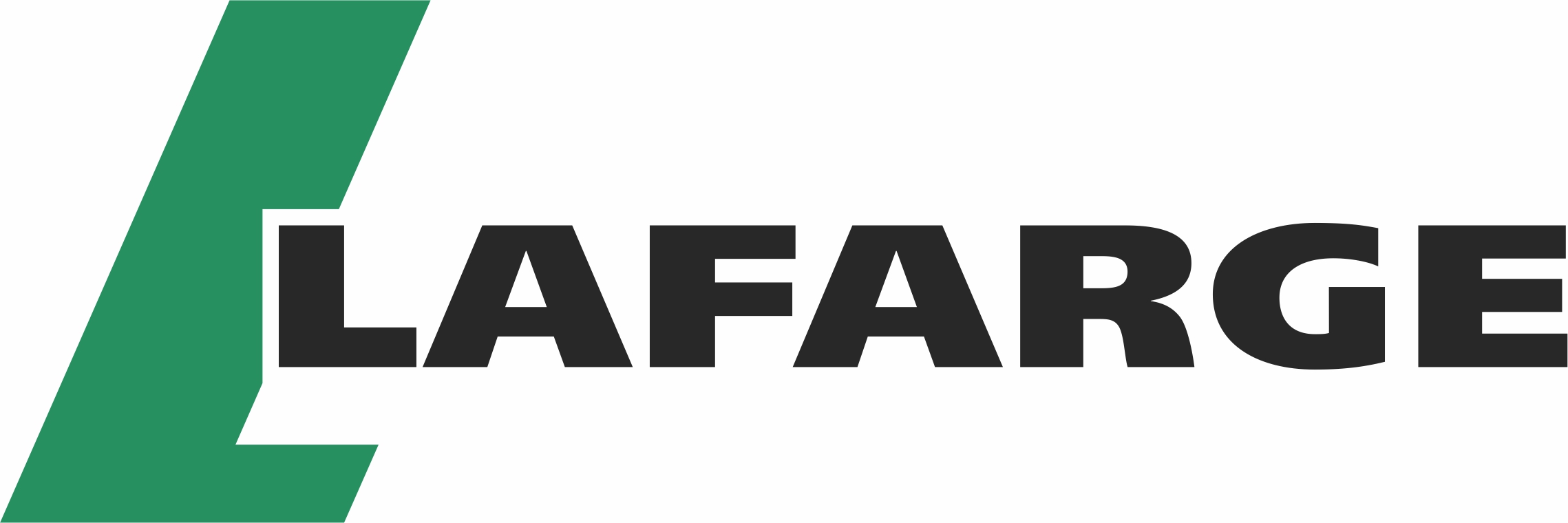
By Aduragbemi Omiyale
One of the leading cement firms, Lafarge Africa Plc, has confirmed plans to expand its plants in Gombe and Ogun States to about 5.5 million metric tonnes per annum.
In a notice to the Nigerian Exchange (NGX) on Wednesday, the company said it was strengthening local cement production with the expansion of its Sagamu Cement Plant in Ogun State and Ashaka Cement Plant in Gombe State.
It noted that the upon completion of the expansion projects, the production capacity of the Ashaka Cement in Gombe State would rise to 2 MT per annum, while the Sagamu facility would increase to 3.5 MT per annum.
The two new plants, the statement disclosed, would be dry plants with preheater kilns, vertical raw mills and roller presses for cement mills to make them energy efficient.
The disclosure signed by the company secretary, Adewunmi Alode, further revealed that the plants are expected to improve product availability and enhance Lafarge Africa’s ability to serve customers efficiently across key markets.
This expansion is coming after the announcement made last year that Huaxin Building Materials Group’s had acquired 83.81 per cent of Lafarge Africa and demonstrates their commitment to Nigeria’s infrastructural development.
The chief executive of Lafarge Africa, Mr Lolu Alade-Akinyemi, stated that the expansion projects reflect the company’s long-term confidence in Nigeria’s growth potential and are aimed at supporting Nigeria’s infrastructure and construction needs.
He explained that the project goes beyond capacity growth to deliver operational and sustainability benefits but also supports value creation for our customers and shareholders while contributing to economic activity and job creation across our host communities and the wider construction ecosystem.
“The expansion of our plants is a strategic investment that reinforces Lafarge Africa’s role in supporting national development. By increasing capacity at our flagship plants, we are strengthening our supply chain, improving our responsiveness to market demand, and positioning the business to better support critical sectors such as housing, commercial construction, and infrastructure.
“It enables us to integrate modern production technologies that enhance efficiency, reliability, and environmental performance, in line with our commitment to responsible operations,” Mr Alade-Akinyemi, stated.
-

 Feature/OPED6 years ago
Feature/OPED6 years agoDavos was Different this year
-
Travel/Tourism9 years ago
Lagos Seals Western Lodge Hotel In Ikorodu
-

 Showbiz3 years ago
Showbiz3 years agoEstranged Lover Releases Videos of Empress Njamah Bathing
-

 Banking8 years ago
Banking8 years agoSort Codes of GTBank Branches in Nigeria
-

 Economy3 years ago
Economy3 years agoSubsidy Removal: CNG at N130 Per Litre Cheaper Than Petrol—IPMAN
-

 Banking3 years ago
Banking3 years agoSort Codes of UBA Branches in Nigeria
-

 Banking3 years ago
Banking3 years agoFirst Bank Announces Planned Downtime
-

 Sports3 years ago
Sports3 years agoHighest Paid Nigerian Footballer – How Much Do Nigerian Footballers Earn




